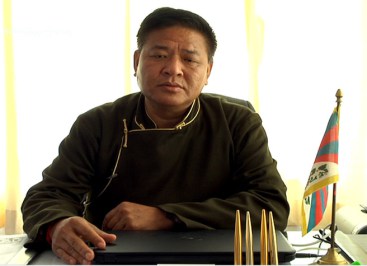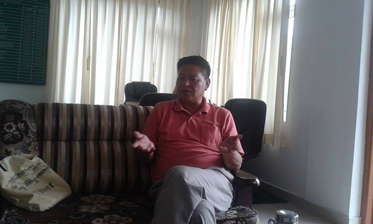PROFILE:
- Born in the Bylakuppe Refugee Camp in 1967
Education:
- Attended the Central School for Tibetans (Bylakuppe), topping the merit list in Class XII
- Attended Madras Christian College, Chennai, where he majored in Economics
Work History:
- Served as the General Secretary for the Tibetan Freedom Movement and the Nigerian Tibet Friendship Association during his college years
- After graduating, became General Secretary of the Central Executive Committee of Do-mey
- Ran a private export business, and later a restaurant
- Served as Executive Director at the Tibetan Parliamentary and Research Centre (TPPRC) at New Delhi from 2001-2008
- Was elected to the 12th and 13th Tibetan Parliament-in-Exile
- Became Speaker of the House of the 14th Tibetan Parliament -in-Exile in 2008, and was re-elected the following term
Key Points:
- Comprehensive experience working with the Parliament
- Focus on maintaining traditional Tibetan culture and language through strategies that support Tibetan youth in Tibetan communities
- Key policy goals include a resettlement plan, the creation of a Tibetan Youth Forum, and the restructuring of the Task Force to make it more multidisciplinary
With over twenty years experience in the service of the Tibetan people, Speaker of the House Penpa Tsering believes himself to be ready to step up and fulfill the duties of Sikyong. Tsering formalised his candidacy bid on August 3 in an announcement to a select group of radio journalists.
From his travels and interactions with Tibetan communities, Tsering believes that the most important thing for the Tibetan community in their fight for freedom and autonomy from China is to “preserve and learn the language and your religion and to preserve the culture and promote it.” Tsering is passionate in his defence of Tibetan culture through the next generation, saying “here we have freedom to do things and if we don’t use that freedom to preserve our identity then who else will do it?”
With this in mind, Tsering has plans for every parliamentary department, focusing on strategies in employment, political expression and cultural preservation to support and engage Tibetan youth. Keeping Tibetan communities of all generations “mentally close even though they are physically apart” is at the forefront of Tsering’s policy agendas.
One such proposal outlined by Tsering is a radical settlement redesign, inspired by Bhave’s Bhoodan movement*. Establishing semi-urban settlements where Tibetan-run health, education and social services could be supported by a consolidated Tibetan residential population and would provide employment opportunities for Tibetan youth, keeping them in the community. Tsering admits that the timescale for such an endeavour would far exceed the term of a Sikyong, and thus emphasises the need not only for Parliamentary support, but also for the innovation of entrepreneurs and investors within the community.
If elected Sikyong, Tsering would also institute a Tibetan Youth Forum. This platform would aim to encourage greater involvement between the parliament and Tibetan youth, encouraging a more nuanced variety of political opinions. “The problem in the Tibetan community is that there is no platform for Tibetan youths other than joining the Tibetan Youth Congress in college and people who aspire for some political vote in the future join that without having a choice.” By creating a new platform for youth expression in a Tibetan Youth Forum, Tsering hopes to create “more interaction between the institution and the younger generation, more sharing of information and inclusion. They should feel part of it, right now they feel out of it.”
Tsering has plans to restructure the Task Force, an advisory committee set up to facilitate dialogue between China and Tibet. Tsering is well aware of his own limitations and believes that greater interdisciplinary collaboration is needed to achieve innovative solutions. “ I don’t know everything, so what I don’t know, I go to the Tibetan people who know, so there are many Tibetan and China experts, you have to reach out to them.” If elected Sikyong, Tsering would dissolve the current Task force and reassemble it with a greater variety of perspectives. In doing this, he hopes to spread the Tibetan issue beyond politics and into mainstream discussion. “We are now in a position of being shoulder to shoulder with other countries’ politicians and with other intellectuals and to speak at forums. We have to use all that expertise.”
As a seasoned politician, Tsering supports the Middle-Way Approach but sees no polarity between this and Rangzen (complete independence for Tibet) believing that the majority of the Tibetan population support freedom by the most practical means. “I would fight for independence, if it was possible. But the problem is, if you go with Rangzen to the Chinese, all the doors and windows are closed. Even now with the middle way, it was open for some time and then it closed and we’ll see if it opens again. If you can’t put your toe on the threshold of the door, then you can’t move in. If you can’t move in, then how will you eat, or drink or talk”.
In the end, Tsering has faith in the new democratic system. He urges Tibetans not to vote for him because of regional loyalty or old associations, saying “vote for me only if you believe I can do a good job”. From the Speaker of the House who offers “not a hand of friendship for diplomacy, but… a bear hug”, the message comes through loud and clear that he has served his time for the Tibetan people, and will continue to do so – win or lose this election. “I don’t know where I will be born in my next life, but this life, my whole life, while I am capable physically and mentally, I will always be there to serve and fight for Tibet”.
* The Bhoodan Movement, also called the “Land Gift Movement”, was a land reform movement in post-Independence India in 1951. Led by Acharya Bhave, the movement asked landowners to give up a percentage of their land for community benefit.
Keep up to date on election issues by following this link to our election news page: Election 2016






 Print
Print Email
Email